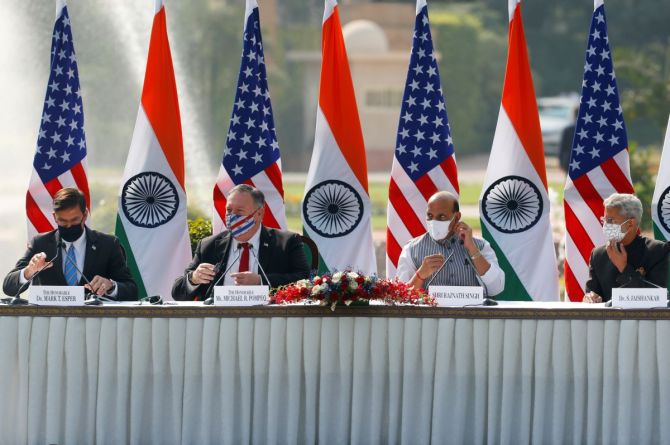Henry Kissinger once said, 'It may be dangerous to be America's enemy, but to be America's friend is fatal.'
India will have to wait and see, observes Rajeev Srinivasan.

In the thick of a heated presidential election campaign, it was remarkable that US Secretary of State Mike Pompeo and Secretary of Defense Mark Esper made a swing through Asia, visiting not only India, but also Sri Lanka, the Maldives, Indonesia and Vietnam.
The signal was that the US commits to its new 'Indo-Pacific' tilt, regardless of who wins the election. It was also meant as a warning to China, which is either making inroads into these countries (Sri Lanka, Maldives), or quarreling with them (India, Indonesia, Vietnam).
There is reason for scepticism. The 2011 'pivot to Asia' by President Obama's team came to naught, and Asians watched in disbelief as America did absolutely nothing while China captured almost the entire South China Sea.
In effect, China called Obama's bluff, and it was a serious foreign policy blunder by him.
But the situation has changed. There's Covid, the decoupling of trade links with China, and ever more aggressive saber-rattling by China.
Even Obama's VP Joe Biden, if he becomes the new US President, will be unable to resume the do-nothing policy because there is now a bipartisan consensus about responding aggressively to China.
In the wake of Chinese intransigence in not only the South China Sea, but also the Taiwan Straits, the Senkaku Islands and on the India-Tibet border, the US has attempted to create partnerships with like-minded partners to contain China. The Quad, which consists of the US, India, Japan and Australia, is the biggest such move.
For the first time since 2007, all four nations in the Quad will take part in the Malabar naval exercises in November, in both the Bay of Bengal and the Arabian Sea.
This is significant, as Australia had in 2007 left the grouping because of concern about what China might think; India had then been very reluctant to let Australia back in.
For India, as a nation that has always preached non-alignment, this feels very close to alignment with the US, although there is no formal treaty. There was lots of rhetoric around the October 27th meeting.
'India will be the most consequential partner for the US in the Indo-Pacific this century.' -- Mark Esper, US defense secretary.
'Big things are happening, as our democracies align to better protect the citizens of our two countries and, indeed, of the free world... The (Chinese Communist Party) is no friend to democracy, the rule of law, transparency, nor to freedom of navigation.' -- Mike Pompeo, US secretary of state.
The Indian side was not quite so effusive, partly because there is some danger in too close a Dhritarashtra Alinganam with a Great Power that has a history of being fickle.
Nevertheless, there was a major agreement signed, BECA or Basic Exchange and Cooperation Agreement, which, at least in theory, enables the exchange of signals intelligence including satellite data.
In addition the Five Eyes partnership of US allies, along with India and Japan have issued joint statements about sharing intelligence gleaned from Internet applications such as WhatsApp, Signal and Telegram.
In addition, there was a slew of agreements in a variety of areas:
'... COVID-19 pandemic response cooperation, supply chain resilience, cooperation in Afghanistan, multilateral peacekeeping, new quadrilateral naval exercises, infrastructure cooperation, and support for the Trump administration's "Blue Dot Network," a strategic energy partnership, a U.S.-India natural gas task force, civil nuclear cooperation, special forces cooperation, and working groups on cybersecurity, counterterrorism, counternarcotics, and space cooperation.' -- Jeff Smith, Research Fellow, Heritage Foundation.
It is clear that China has driven India into America's arms. But there is a cautionary tale.
Henry Kissinger once said, It may be dangerous to be America's enemy, but to be America's friend is fatal.'
India will have to wait and see.
Rajeev Srinivasan is one of Rediff.com's earliest columnists.
You can read Rajeev's columns here.
Feature Presentation: Aslam Hunani/Rediff.com










 © 2025
© 2025